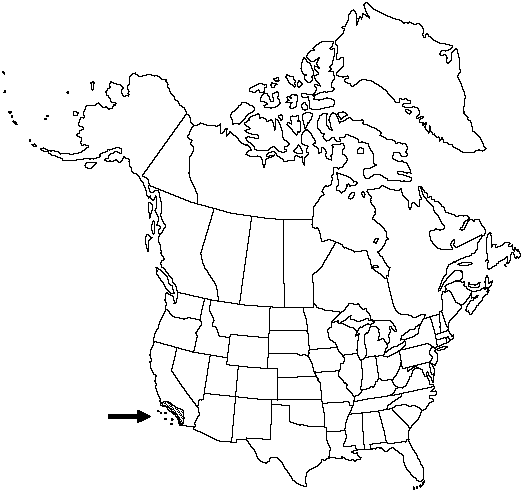Difference between revisions of "Pseudotsuga macrocarpa"
Wald. Nordamer. 278, plates 6, 8, 9. 1890.
Common names: Bigcone Douglas-fir bigcone-spruce
Basionym: Abies macrocarpa Vasey
Synonyms: Pseudotsuga californica FlousPseudotsuga douglasii var. macrocarpa (Vasey) Engelmann
Treatment appears in FNA Volume 2.
FNA>Volume Importer |
FNA>Volume Importer |
||
| Line 26: | Line 26: | ||
}}<!-- | }}<!-- | ||
| − | --><span class="statement" id="st- | + | --><span class="statement" id="st-undefined" data-properties=""><b>Trees </b>to 44m; trunk to 2.3m diam.; crown broadly conic. <b>Twigs</b> slender, glabrous or pubescent. <b>Leaves</b> (20–)25–45 × 1–1.5mm, bluish green, apex mucronulate. <b>Pollen</b> cones pale yellow. <b>Seed</b> cones 9–20 × 4–7cm. <b>Seeds</b> 9–12mm. <b>2n</b> =24.</span><!-- |
-->{{Treatment/Body | -->{{Treatment/Body | ||
| Line 58: | Line 58: | ||
|publication year=1890 | |publication year=1890 | ||
|special status= | |special status= | ||
| − | |source xml=https://jpend@bitbucket.org/aafc-mbb/fna- | + | |source xml=https://jpend@bitbucket.org/aafc-mbb/fna-data-curation.git/src/9216fc802291cd3df363fd52122300479582ede7/coarse_grained_fna_xml/V2/V2_129.xml |
|genus=Pseudotsuga | |genus=Pseudotsuga | ||
|species=Pseudotsuga macrocarpa | |species=Pseudotsuga macrocarpa | ||
| − | |||
| − | |||
| − | |||
| − | |||
| − | |||
| − | |||
| − | |||
| − | |||
| − | |||
| − | |||
| − | |||
| − | |||
| − | |||
| − | |||
| − | |||
}}<!-- | }}<!-- | ||
-->[[Category:Treatment]][[Category:Pseudotsuga]] | -->[[Category:Treatment]][[Category:Pseudotsuga]] | ||
Revision as of 13:11, 27 July 2019
Trees to 44m; trunk to 2.3m diam.; crown broadly conic. Twigs slender, glabrous or pubescent. Leaves (20–)25–45 × 1–1.5mm, bluish green, apex mucronulate. Pollen cones pale yellow. Seed cones 9–20 × 4–7cm. Seeds 9–12mm. 2n =24.
Habitat: Slopes, cliffs, and canyons, in chaparral and mixed coniferous forests
Elevation: 200–2400m
Discussion
Pseudotsuga macrocarpa, a tree of scattered occurrence and of no concern for timber, is valuable for esthetics and watershed protection. The northernmost stands of the species, in Kern County, are about 35 kilometers east of the closest approach of P. menziesii.
Selected References
Lower Taxa
None.
